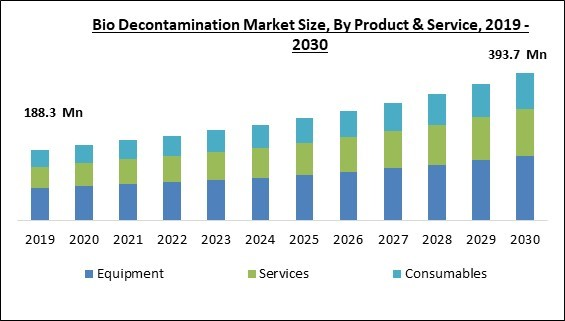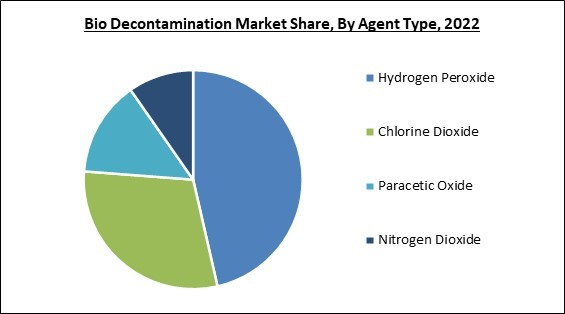The Bio Decontamination products are widely accessible in the Asia Pacific region due to the numerous merchants that are present there. Therefore, Asia Pacific region accounted for $57.3 million revenue in the market in 2022. The world's expanding economies, including those of China, India, and others, provide market participants with tremendous prospects, fuelling the industry's expansion during the course of the projection period. The market is anticipated to be driven shortly by the expanding outsourcing of bio-decontamination operations. Moreover, the market will grow in the near future due to the booming biopharma industry and the demand for improved bio-decontamination equipment. Some of the factors impacting the market are significant growth in biotechnology & pharmaceutical industry, rising healthcare industry and growing outsourcing in developing nations, and pathogen resistance is variable.
R&D spending, results, expenses, and the introduction of novel pharmaceutical products have all increased noticeably over the past twenty years. The pharmaceutical sector earmarked millions more than the industry spent annually in the 1980s for research and development. More newly licensed medications were made commercially available from 2010 to 2019 than in the previous ten years. The market demand results from increasing R&D spending and an increased emphasis on developing novel therapeutic, diagnostic, and therapeutic products. Developed nations view emerging markets like China and India as cost-cutting hubs. In the past ten years, companies in developed markets, like the US and Europe, have outsourced their production and packaging activities to Taiwan, South Korea,China,and India to take advantage of these nations' lower labor costs and laxer regulatory frameworks. As these nations develop into significant manufacturing hubs, there is an increased emphasis on quality standards and the implementation of highly technological goods to meet client demands. Hospitals utilized bio-decontamination services like Bioquell's rapid bio-decontamination services (RBDS) in 2021 to transform COVID-19 wards into regular wards. Since the pandemic stabilized after 2020, COVID-19's total influence on the bio-decontamination market during the pandemicwas also expanding gradually, and it is anticipated that this growth will continue in the years to come. As a result, the market has benefited from the pandemic outbreak.
However, in the market, pathogen challenge variability is a crucial factor. The persistence,resistance,and susceptibility of various diseases to decontamination techniques varies. The resistance and susceptibility to decontamination of various pathogens kinds provide diverse difficulties. Each type of microorganism has unique traits and reactions to disinfectants or decontamination techniques, including viruses,bacteria,fungi, and spores. Disinfectants may have difficulty reaching and effectively eradicating germs depending on the type of surface, porosity,texture,and the presence of organic or inorganic substances.
Product & Service Outlook
Based on product & service, the market is classified into equipment, services, and consumables. In 2022, the consumables segment acquired a substantial revenue share in the market. Consumables are essential for controlling and overseeing bio-contamination in various settings, including labs, hospitals, and industrial sites. For instance, PPE reduces the risk of contamination by putting a barrier between people and potentially infectious objects. To avoid swabs, cross-contamination, applicators are normally manufactured of sterile materials and are thrown after only one usage.Agent Type Outlook
On the basis of agent type, the market is categorized into hydrogen peroxide, chlorine dioxide, peracetic acid, nitrogen dioxide. The hydrogen peroxide segment witnessed the largest revenue share in the market in 2022. Low concentrations of hydrogen peroxide vapor are an effective decontaminant for a variety of microorganisms. In addition to penetrating the majority of materials, VHP has the ability to eliminate microorganisms from seams & joints. By permeating them, a vapor can efficiently enter these spaces. The vapor of hydrogen peroxide can also pass through plastic membranes. Most polymers and adhesives used to create gadgets cannot sustain high temperatures without suffering any consequences.Type Outlook
By type, the market is fragmented into chamber decontamination, and room decontamination. The chamber decontamination segment dominated the market with the maximum revenue share in 2022. This is explained by its low price and minimal power consumption. Decontamination chambers are designed for use in industrial, laboratory, pharmaceutical, and research settings. They provide a gas-tight room for routine decontamination inside a business as well as quick and simple decontamination of items and equipment entering a clean facility. The elements above should fuel the segment's predicted revenue growth.End-user Outlook
Based on end user, the market is bifurcated into pharmaceutical & medical device manufacturing companies, life sciences & biotechnology research organizations, and hospitals & healthcare facilities. In 2022, the hospitals & healthcare facilities segment covered a considerable revenue share in the market. The need for clean facilities in the healthcare &research sectors has become more widely recognized, especially in developed and developing economies. To stop the development of multi-antibiotic drug-resistant bacteria outbreaks and extremely dangerous viral pandemics like COVID, hospitals obviously need to be able to clean their facilities and enhance their capacity.Regional Outlook
Region wise, the market is analysed across North America, Europe, Asia Pacific, and LAMEA. The North America region led the market by generating the highest revenue share in 2022. Growth in the market is anticipated to be fuelled by developments in these technologies made by key companies, an increase in surgical operations, a rise in hospital-acquired infections, and strict rules and regulations implemented by regulatory bodies. Additionally, the region is producing and exporting more pharmaceutical goods.The market research report covers the analysis of key stake holders of the market. Key companies profiled in the report include STERIS PLC, Ecolab, Inc., TOMI Environmental Solutions, Inc., JCE Biotechnology SAS, Fedegari Autoclavi S.p.A., Zhejiang TAILIN Bioengineering Co., Ltd., Howorth Air Technology Limited, Solidfog Technologies SPRL, ClorDiSys Solutions, Inc., and Amira Srl.
Scope of the Study
By Agent Type
- Hydrogen Peroxide
- Chlorine Dioxide
- Paracetic Oxide
- Nitrogen Dioxide
By Product & Service
- Equipment
- Services
- Consumables
By Type
- Chamber Decontamination
- Room Decontamination
By End-user
- Pharma & Medical Device Companies
- Life Science & Biotechnology Research Organizations
- Hospitals & Healthcare Facilities
By Geography
- North America
- US
- Canada
- Mexico
- Rest of North America
- Europe
- Germany
- UK
- France
- Russia
- Spain
- Italy
- Rest of Europe
- Asia Pacific
- China
- Japan
- India
- South Korea
- Singapore
- Malaysia
- Rest of Asia Pacific
- LAMEA
- Brazil
- Argentina
- UAE
- Saudi Arabia
- South Africa
- Nigeria
- Rest of LAMEA
Key Market Players
List of Companies Profiled in the Report:
- STERIS PLC
- Ecolab, Inc.
- TOMI Environmental Solutions, Inc.
- JCE Biotechnology SAS
- Fedegari Autoclavi S.p.A.
- Zhejiang TAILIN Bioengineering Co., Ltd.
- Howorth Air Technology Limited
- Solidfog Technologies SPRL
- ClorDiSys Solutions, Inc.
- Amira Srl
Unique Offerings
- Exhaustive coverage
- The highest number of Market tables and figures
- Subscription-based model available
- Guaranteed best price
- Assured post sales research support with 10% customization free
Table of Contents
Companies Mentioned
- STERIS PLC
- Ecolab, Inc.
- TOMI Environmental Solutions, Inc.
- JCE Biotechnology SAS
- Fedegari Autoclavi S.p.A.
- Zhejiang TAILIN Bioengineering Co., Ltd.
- Howorth Air Technology Limited
- Solidfog Technologies SPRL
- ClorDiSys Solutions, Inc.
- Amira Srl










